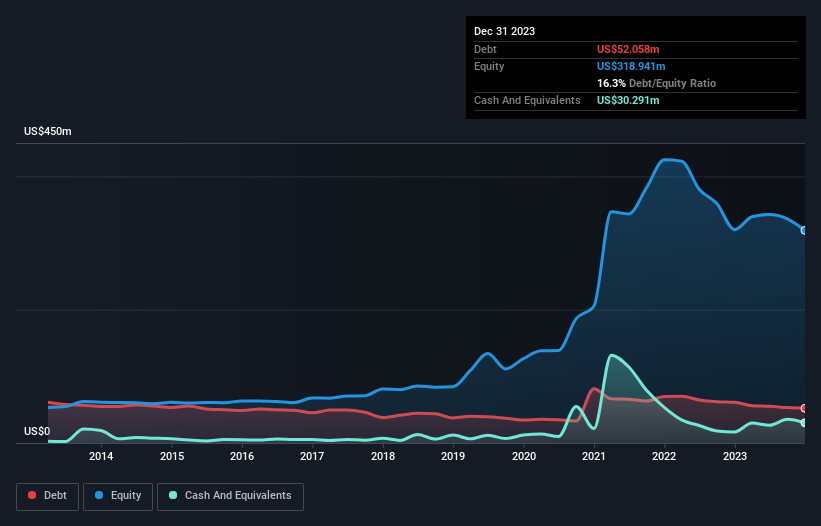
Legendary fund manager Li Lu (who Charlie Munger backed) once said, 'The biggest investment risk is not the volatility of prices, but whether you will suffer a permanent loss of capital.' So it seems the smart money knows that debt - which is usually involved in bankruptcies - is a very important factor, when you assess how risky a company is. As with many other companies Village Farms International, Inc. (NASDAQ:VFF) makes use of debt. But should shareholders be worried about its use of debt?
When Is Debt A Problem?
Debt assists a business until the business has trouble paying it off, either with new capital or with free cash flow. Part and parcel of capitalism is the process of 'creative destruction' where failed businesses are mercilessly liquidated by their bankers. However, a more frequent (but still costly) occurrence is where a company must issue shares at bargain-basement prices, permanently diluting shareholders, just to shore up its balance sheet. Of course, debt can be an important tool in businesses, particularly capital heavy businesses. The first thing to do when considering how much debt a business uses is to look at its cash and debt together.
Check out our latest analysis for Village Farms International
What Is Village Farms International's Net Debt?
You can click the graphic below for the historical numbers, but it shows that Village Farms International had US$52.1m of debt in December 2023, down from US$61.0m, one year before. On the flip side, it has US$30.3m in cash leading to net debt of about US$21.8m.

How Healthy Is Village Farms International's Balance Sheet?
According to the last reported balance sheet, Village Farms International had liabilities of US$72.2m due within 12 months, and liabilities of US$75.9m due beyond 12 months. On the other hand, it had cash of US$30.3m and US$30.9m worth of receivables due within a year. So its liabilities total US$86.9m more than the combination of its cash and short-term receivables.
This deficit is considerable relative to its market capitalization of US$94.8m, so it does suggest shareholders should keep an eye on Village Farms International's use of debt. This suggests shareholders would be heavily diluted if the company needed to shore up its balance sheet in a hurry. There's no doubt that we learn most about debt from the balance sheet. But ultimately the future profitability of the business will decide if Village Farms International can strengthen its balance sheet over time. So if you're focused on the future you can check out this free report showing analyst profit forecasts.
Over 12 months, Village Farms International made a loss at the EBIT level, and saw its revenue drop to US$286m, which is a fall of 2.7%. We would much prefer see growth.
Caveat Emptor
Over the last twelve months Village Farms International produced an earnings before interest and tax (EBIT) loss. Its EBIT loss was a whopping US$16m. When we look at that and recall the liabilities on its balance sheet, relative to cash, it seems unwise to us for the company to have any debt. Quite frankly we think the balance sheet is far from match-fit, although it could be improved with time. However, it doesn't help that it burned through US$1.2m of cash over the last year. So suffice it to say we do consider the stock to be risky. There's no doubt that we learn most about debt from the balance sheet. But ultimately, every company can contain risks that exist outside of the balance sheet. For instance, we've identified 2 warning signs for Village Farms International that you should be aware of.
At the end of the day, it's often better to focus on companies that are free from net debt. You can access our special list of such companies (all with a track record of profit growth). It's free.
New: Manage All Your Stock Portfolios in One Place
We've created the ultimate portfolio companion for stock investors, and it's free.
• Connect an unlimited number of Portfolios and see your total in one currency
• Be alerted to new Warning Signs or Risks via email or mobile
• Track the Fair Value of your stocks
Have feedback on this article? Concerned about the content? Get in touch with us directly. Alternatively, email editorial-team (at) simplywallst.com.
This article by Simply Wall St is general in nature. We provide commentary based on historical data and analyst forecasts only using an unbiased methodology and our articles are not intended to be financial advice. It does not constitute a recommendation to buy or sell any stock, and does not take account of your objectives, or your financial situation. We aim to bring you long-term focused analysis driven by fundamental data. Note that our analysis may not factor in the latest price-sensitive company announcements or qualitative material. Simply Wall St has no position in any stocks mentioned.
About NasdaqCM:VFF
Village Farms International
Produces, markets, and sells greenhouse-grown tomatoes, bell peppers, and cucumbers in North America.
Undervalued with excellent balance sheet.
Similar Companies
Market Insights
Community Narratives



